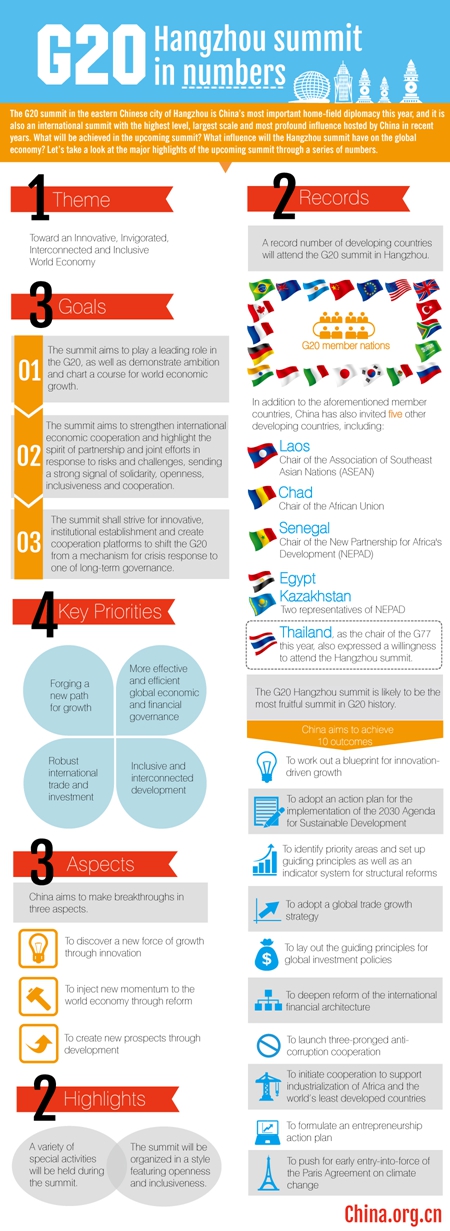G20 charts course for smooth sailing of world economy
 0 Comment(s)
0 Comment(s) Print
Print E-mail China.org.cn, September 28, 2016
E-mail China.org.cn, September 28, 2016
|
|
|
President Xi Jinping attends a press conference after the 11th summit of the Group of 20 (G20) major economies in Hangzhou, east China's Zhejiang Province, Sept. 5, 2016. |
The two-day G20 leaders' summit was held in the Chinese city of Hangzhou in early September. It was the first time for China to host the annual meeting which attracts influential leaders from the world's major economies and international organizations.
Global economy at "critical juncture"
The summit was held amid prolonged stagnant global economic growth. "The global economy has arrived at a critical juncture," said General Secretary Xi Jinping of the Central Committee of the Communist Party of China (CPC), also Chinese president, at the opening ceremony. "Engines of growth from the previous round of technological progress are gradually fading, while a new round in the technological and industrial revolution has yet to gain momentum."
In June, the World Bank slashed its 2016 global growth forecast to 2.4% from the 2.9% it projected in January, citing sluggish growth in the advanced economies, stubbornly low commodity prices, weak global trade and diminishing capital flows. In July, the International Monetary Fund also cut its global growth forecast by 0.1% to 3.1%.
It is imperative for the world's top 20 economies -- representing 90 percent of global GDP, 80 percent of global trade and two-thirds of the world's population-- to prescribe a cure that can bring the world economy back to health.
Summit yields fruitful results
Against the backdrop of lackluster growth, China set the theme of this year's summit as "building towards an innovative, invigorated, interconnected and inclusive world economy", which it sees as the way forward in dealing with the spate of problems in which the world is currently mired.
After much discussion over two days, President Xi was able to tell Chinese and foreign journalists that the summit had "yielded fruitful results and achieved its expected goals."
He noted that the leaders of the G20 member countries, invited guests from other countries and international organizations had exchanged in-depth views on a variety of important topics. These included greater efficiency in global economic and financial governance, promotion of robust international trade and investment, inclusive and interconnected development, and other prominent issues affecting the overall world economy including climate change, refugees, anti-terrorism financing and global public health.
President Xi also introduced the consensus reached and the main results achieved during the summit, which he summarized in five aspects. First, all parties were determined to point the desired way and set the course for the world economy. Countries are committed to further strengthening macro-policy communication and coordination, and leveraging various effective tools from fiscal, monetary and structural aspects.
Second, all the member countries were determined to forge a new path for growth and instill new dynamism into the world economy. They adopted the G20 Blueprint on Innovative Growth, which sees innovation as the new engine of economic growth.
Third, countries agreed to improve global economic and financial governance, including advancing changes in the national quotas and governance reform of international financial institutions such as the IMF, strengthening implementation of various financial reforms and jointly safeguarding stability in financial markets.
Fourth, all parties are determined to revitalize international trade and investment as key engines of growth and build a more open global economy. They worked out the G20 Strategy for Global Trade Growth and the G20 Guiding Principles for Global Investment Policy that lays out the first global framework of multilateral rules governing international investment.
Last but not least, they stressed their determination to promote inclusive and interconnected development. Countries have for the first time given priority to developments in regard to the global macro-policy framework and devised a groundbreaking Action Plan on the 2030 Agenda for Sustainable Development.
|
|
|
Clay figures featuring the leaders to attend the G20 Summit seen in Hangzhou, Zhejiang Province, Sept. 1, 2016. Made by artist Wu Xiaoli with the name "Dream of World Peace", the clay figures were displayed at Hangzhou's Qiaoxi historic block. |
Summit draws world attention
The two-day summit drew worldwide attention. Leaders of the G20 member countries as well as international organizations hailed the meeting as successful and thanked China for its hard work as host.
United Nations Secretary General Ban Ki-moon said at a press conference he "really appreciates" China's efforts to invite the largest number of developing countries to attend the G20 summit as observers. "It's easy to say 'we support developing countries', but it is difficult to really take action to help them," Ban said.
Others have also praised China for setting an example of long-term sound growth. President Enrique Pena Nieto of Mexico said, "China is continuing to grow, despite complicated global conditions. We must study its experience to learn from its successful practices."
As President Xi had called for participating countries during the opening ceremony to "steer the giant ship of global economy on a new voyage… to the vast ocean," the G20 Hangzhou Summit will chart the course for smoother sailing of the world economy.
|
Infographic: G20 Hangzhou summit in numbers |









Go to Forum >>0 Comment(s)